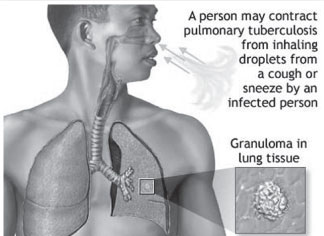|

World TB Day on March 24:
Sri Lanka on the road to eliminating TB
by Nilma Dole
“Compared to India and the African countries, Sri Lanka is better
equipped to tackle tuberculosis (TB) and we are confident that we can
eliminate TB soon,” said the director of the National Programme for
Tuberculosis Control and Chest Diseases (Ministry of Health) Dr. Sunil
de Alwis.
According to the doctor “A simple example of earliest TB problems in
popular culture is in the scene of the book/film Gamperaliya where the
character of star-crossed lover Piyal takes Nanda to the doctor
immediately after suspecting she has TB because she spits blood with her
sputum.”
He said that TB affected people five thousand years ago to even the
time of Egyptian mummies which can be recorded from their skeletons.

Tuberculosis is an infectious disease brought about by the bacteria
called Mycobacterium Tuberculosis.
“It can affect any tissue in the body but in 80 percent of cases, it
affects mostly the lungs which is called Pulmonary Tuberculosis,” said
Dr. de Alwis.
The disease also has the ability to affect other parts of the body
such as the central nervous system, genitourinary system, circulatory
system, lymphatic system, gastrointestinal system, joints, bones and
even the skin and this is called Extrapulmonary Tuberculosis.
“TB can generally be identified in the sputum of the person thought
to be affected which is the actual deep-throat phlegm that is drawn from
a person’s spit,” said the doctor.
Active TB indicates that bacteria are multiplying in the body and
symptoms will soon show up. If the TB is located in the lungs also
called Pulmonary TB, it can spread easily to others. “A little sputum
can infect 10 to 15 healthy people, so it is important to check your
sputum if you suspect of contracting TB,” said Dr. de Alwis.
According to the doctor, one-third of Sri Lanka’s total population is
already affected by TB which is called Latent TB but only in 10%
symptoms will show up, giving rise to Active TB.
“Symptoms of active TB include persistent coughing for more than two
weeks which could be accompanied by blood in the sputum. Other symptoms
include weight loss, fatigue, fever, chest pains and sweating during
night,” he said.
In patients having Latent TB this means that the bacteria is dormant
in the body but provided the immune system is strong enough to ward off
the bacteria.
“The bacteria can be restained from turning into an active one where
no symptoms of TB are seen and the disease cannot spread to others. Yet,
if TB is latent, it can turn into active at any time as soon as the
immunity drops,” said the doctor.
About one-fifth of HIV patients die due to TB and Pulmonary TB (in
the lungs) is highly infectious that spreads via droplets from the
throat and lungs of those already infected with the disease.
“Transmission of the disease happens when an infected person coughs
or breathes out air containing the TB bacteria or if the sputum isn’t
burned and has the ability to thrive in certain conditions,” said Dr. de
Alwis.
In diagnosing TB, Latent TB is diagnosed with the help of a
Tuberculin skin test where TB antibodies are injected under the skin of
the wrist. The doctor said that the presence of the TB bacteria in the
body will cause a red bump to appear on the skin exactly where the
needle pierced the skin.
“The test can also report what degree of the infection has spread
including its potency, indicating if it can be passed to others,” said
Dr. de Alwis.
“Active TB is treated with a combination of four antibiotics to be
taken at the same time, called as Multiple-drug Therapy for a period of
6 months at least. This can be a problem for patients because it isn’t
easy to swallow it all at once,” said the doctor.
Unfortunately, there is no solution to the swallowing problem and Dr.
Alwis said that the National TB program is now involved in educating
family members and medical personnel in doing a procedure called the
Harlem Directly Observed Therapy (DOT) program.
“This is used where patients are supervised while medication is
administered, has been effective in controlling the spread of TB,” he
said.
Victims of latent TB need to take just one antibiotic for a period of
nine months, which cuts the risk of latent TB turning active.
There are several antibiotics which are used that can completely cure
a TB patient and some medicines are administered in case the patient
does not respond to treatment or is infected with drug-resistant TB
bacteria.
“It is important that the prescribed medicines be taken strictly for
the stipulated period for a successful treatment. If patients stop
taking the medication prematurely, the condition may worsen and lead to
a more dangerous form and drug resistant TB is tough for treatment,”
said Dr. de Alwis.
Sri Lanka’s good health policies have increased life expectancy which
has improved the quality of life compared to other countries including
industrialised nations such as Russia. “However, in order to eliminate
the disease, this is to be achieved by controlling preventable diseases
and by health promotion activities,” said the doctor.
Even though tuberculosis is still continuing to be a major public
health problem in the country, a good program is in place to help
patients totally cure themselves with a good treatment plan.
“About 2000 new cases of tuberculosis are reported every year in the
Colombo district and 10,000 annually in the rest of the country.
Out of this number, around 60% are smear-positive pulmonary TB cases.
The National Programme for Tuberculosis Control and Chest Diseases is
a decentralised unit which controls tuberculosis as well as other chest
diseases in the country. It functions through a network of 26 District
Chest Clinics and two Chest hospitals in close coordination with other
general health institutions,” doctor de Alwis said.
Nevertheless, the he said that with global funds for preventing and
eradicating diseases including TB worldwide, the Ministry of Health and
Nutrition has given more mobility and freedom for the TB campaign to go
smoothly.
More than just the TB disease, there is a social stigma surrounding
TB patients because people fear being infected with the disease. “We are
worried that sometimes TB patients do not divulge their identity and
give wrong addresses so when we want to genuinely help them, they are
worried that someone will discriminate them.
Unlike AIDS, TB is 100 percent treatable so we are always willing to
help these people,” said the doctor.
Today, TB testing has been successful around the country. “We have a
National TB testing laboratory in Welisara and opened the lab in Kandy
last year. In addition to Colombo and Kandy, we also have special TB
facilities in Gampaha, Galle and Kalutara,” he said.
He added, “We found that 200 new TB patients are identified in the
prisons every year and we have installed an X-ray machine at the
Welikada Prison to assist in curing the prisoners who have TB.”
Dr. de Alwis said that with all the successes of steadily eliminating
TB every year with less cases, the National TB program did a special
screening for the IDPs and have been doing tests for newly-settled Sri
Lankans in the North and East to make sure they are TB free when they
relocate to Sri Lanka.
This year Sri Lanka will mark World TB Day with special activities
conducted in Polonnaruwa with several islandwide exhibitions, art
competitions and TB walks to create awareness among the public about
prevention and treatment of TB. The Global Plan to Stop TB is the
general theme for 2006 until 2015.
The success of the Global Plan to Stop TB 2006-2015 relies on the
assistance of family members of patients, healthcare providers and
patients themselves to make sure that treatment is continued diligently
for the stipulated period.
If the objectives of the Stop TB 2006-2015 are met, it can save the
lives of 14 million people every year and offer treatment to 50 million
people. “It will be a reality when we eliminate TB so that we all can
breathe free and easily without fear,” said Dr. de Alwis.
How to survive at work despite your Chronic Fatigue Syndrome
symptoms
by George Cranston
Chronic Fatigue Syndrome (CFS) condition can be as severe as
depressive disorder or disseminated sclerosis. It can ruin your
performance at work, incite conflicts with fellow workers, and even have
you fired or demoted.

Troubles at work may lead to further financial, psychological, and
emotional stresses, which can aggravate your condition. Taking actions
to reduce worksite pressure, modifying your work plan, and learning
effective coping skills may significantly improve your performance and
reverse the painful downward spiral.
When you are newly diagnosed with a health condition that is
incurable or has no predictable end, you deal with a set of intimidating
challenges - medical, professional, social, and emotional - as you learn
how to manage it. For people in the midst of developing careers, it
could be difficult whether they should disclose their health conditions
to supervisors and fellow workers.
You may be worried about how other people will react.
And because CFS symptoms are undefined and still are not fully
recognized by some experts in the medical society, perhaps you are
worried that your superiors won’t take your condition seriously.
You can become anxious, even dismayed at the effort of concealing
your “little secret”; you realize that you will not be able to deal with
your normal workload and perform well. You may also be concerned about
your financial obligations.
If you can’t work, how will you cover your daily expenses?
If you’re applying for a job, you may feel vulnerable. Do you need to
tell a future employer about your CFS condition, will he be okay with
your special requirements? You may even feel that you need to hide your
condition to improve your chance of getting a job.
The decision to notify others about your CFS condition is an entirely
personal matter, one that you need to live with, whatever your decision
is. After you tell them, you won’t be able to take it back. However, for
many people, honesty isn’t negotiable.
They feel being forthright can reduce their stress level and allow
them to know exactly where they need to stand.
For others, disclosing about CFS can become very risky; they fear
loss of status, embarrassment, and the burden of knowing that your
condition is no longer a secret. So should you tell them? The decision
is completely up to you.
The aftermaths of disclosure can seem imprecating either way.
Certainly, you can be demoted to a less important job position for
being sick and consequently your benefits and salary, may be
significantly reduced.
You may try to deal with your illness by using vacation and sick time
to rest each time your symptoms are especially debilitating, but what
happens when your vacation or sick days is running out and you still
can’t go to work? You can’t risk being fired, due to financial issues.
Answering this dilemma won’t be easy, but there are ways to weigh in
your options.
The only good way to decide whether you need to disclose your
situation is by dispassionately reviewing your situation and taking
these factors into account:
Considering your work culture:
Does your work only require you to work with a computer? Then you
should consider disclosing your CFS condition and determine whether you
are allowed to work from home for a few days each week. If not, you may
need to find another job.Considering your employer: Are your superiors
receptive and open, or are they intolerant types who despise those who
go home “early” at 5 pm?
Hopefully, you have the former, but if you don’t, you should tell
them that your CFS symptoms prevent you from working properly. If your
CFS symptoms reduce your performance, you should take time off or even
resign your position and if possible work at home.
Considering your fellow workers:
Are your co-workers super-competitive and always on the look for your
soft spot? However, if they are supportive, you should honestly tell
them about your condition.
If you can’t find a good way to disclose your situation, confide in a
close colleague you consider a good friend and elaborate an effective
strategy.
Perhaps your colleagues will be more acceptive if they understand
that you are not simply slacking off after a wild party last night.
Certainly, you may need to consider for other more accommodating job
if your colleagues consider you “too soft” for having CFS symptoms.
Your HR (human resources) department:
Will the head of HR department back you up and agree to accommodate
your special requirements? Only you can choose how much to tell your
supervisors about your CFS condition.
On the plus side, notifying them about your CFS diagnosis is a good
way to safeguard your legal right to retain your job. The HR department
should have a valid confirmation from reputable medical institutions
about your disability. (Source: Health Guidance)
Risk to seniors of multi-tasking on the street
Older adults may put themselves at risk by talking on cell phones
while crossing the street, researchers report in a new study.

The researchers found that adults aged 59 to 81 took significantly
longer than college students to cross a simulated street while talking
on a mobile phone, and their heightened cautiousness in initiating
crossing did nothing to improve their safety. Older adults on cell
phones also were more likely to fail to cross in the time allotted for
the task.
The findings, from researchers at the University of Illinois, appear
in the journal Psychology and Aging.
In the study, 18 undergraduate students (aged 18 to 26 years) and 18
older adults crossed simulated streets of varying difficulty while
either undistracted, listening to music or conversing on a hands-free
cell phone.
The older adults were significantly impaired on the most challenging
street-crossing tasks while also engaged in a second activity, with the
most pronounced impairment occurring during cell phone conversations.
The younger adults showed no impairment on dual-task performance, the
researchers found.
“It should be noted that we have previously found that younger adults
show similar performance decrements, but under much more challenging
crossing conditions,” said lead author Mark Neider, a postdoctoral
researcher who conducted the study with Illinois psychology professor
and Beckman Institute director Art Kramer.
“Combined with our previous work, the current findings suggest that
while all pedestrians should exercise caution when attempting to cross a
street while conversing on a cell phone, older adults should be
particularly careful,” Neider said
Source: Diana Yates University of Illinois at Urbana-Champaign
Obesity during pregnancy complicates delivery
A new study at Liverpool University has found that overweight
pregnant women are more likely to be overdue and have more complicated
births.
Women who were overweight or obese before they conceived were more
likely to have a longer pregnancy, need to have labour induced
artificially and to go on to require caesarean section births.
For the study, the research team examined the records of almost
30,000 women who gave birth over four years.
Three in ten obese women were overdue, defined as still pregnant ten
days after their due date, compared with around two in ten of healthy
weight women.
The study found more than a third of obese women had their labour
induced, compared with just over a quarter of normal weight women.
In addition almost three in ten obese women had an induction of
labour, which later resulted in a caesarean delivery compared to less
than two in ten normal weight women.
“Maternal obesity has become one of the most commonly occurring risk
factors in obstetric practice including greater risk of prolonged
pregnancy,” the Telegraph quoted Dr Sarah Arrowsmith, from the
University of Liverpool’s Institute of Translational Medicine, and lead
author on the paper as saying.
The study has been published in the British Journal of Obstetrics and
Gynaecology.
Youth with IBD are less fit than their peers
Children and adolescents growing up with inflammatory bowel disease (IBD)
are less fit than their peers, says a study by researchers at McMaster
University and the McMaster Children’s Hospital.

The study, published in the Journal of Paediatrics online, shows
children and youth with the most common forms of inflammatory bowel
disease have aerobic fitness levels 25 percent lower than the other
children in their age, and their muscle function is 10 percent lower.
“Raising a child with a chronic condition is challenging, but we need
to look at more than just ‘fixing the child’ and think about active
living to reduce the risk of future health problems,” said principal
investigator Brian Timmons of the Child Health and Exercise Medicine
Program at the university and hospital.
The study showed that patients with inflammatory bowel disease in
remission also have poor fitness that may start at an early age.
Fitness during childhood is an important predictor of adult health,
said Timmons. “Closer attention needs to be paid to the physical
activity levels and participation habits of youth with IBD. This starts
with the child’s doctor.”
Investigators teamed up to measure aerobic fitness and muscle
function in patients with either Crohn’s disease and ulcerative colitis,
the most common forms of inflammatory bowel disease, while they were in
remission. The prevalence of inflammatory bowel disease among Canadian
youth is between 18 and 70 per 100,000, depending on the province.
Timmons said the study confirms that patients should be encouraged to
be as active as possible and families should be provided resources about
active living. Clinicians who specialize in paediatric IBD should
consider referring patients with IBD for exercise testing and
involvement of an activity therapist or physiotherapist in the clinical
management of these youth.
He said there are no specific recommended activities, but “patients
are likely to benefit from a variety of activities and sports that they
find enjoyable and fun.”
(Source: McMaster University)
|

